
| Publisher: | Scribner | |
| Genre: | Fiction, Short Stories (single author), Literary | |
| ISBN: | 9781451617580 | |
| Pub Date: | November 2012 | |
| Price: | $25 |
| Starred | Fiction |
by Ron Hansen
The diversity of subject matter in the 20 stories in Ron Hansen's She Loves Me Not is remarkable. He writes in different voices, faithfully rendering the broken English of a priest who is a native Polish speaker in "My Communist" and the offhand conversational tone of a scullery maid in the English countryside of horse and carriage days in "The Governess."
He can also recount the most mundane conversations perfectly. In "Can I Just Sit Here for a While?" Hansen introduces Rick Bozack, a crackerjack salesman who loves his work, enjoys the motel rooms with their "bolted-down color TV topped with cellophane-wrapped peppermints... the coffee thermos... the sweat on his ice-water glass.... What were they feeding everybody about the hard life on the road? You'd have to be zonkers not to love it."
When Rick and two friends go to a basketball game together, clichés fly as the three men talk about "testing the waters," "put it on the back burner," "get a better lay of the land." The conversation is absolutely authentic, skimming the surface of what all three are really thinking about.
Ranging over subjects as different as Oscar Wilde in Omaha and a poignant vignette about dementia, or two damaged people possibly finding love and the important lesson in a sparrow's flight and murder, Hansen shapes the short story genre to his own ends again and again. His literary expertise, his craftsmanship and his profound insight into what people are capable of are refined to perfection in each of these stories. --Valerie Ryan, Cannon Beach Book Company, Ore.
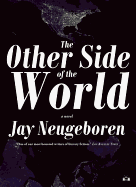
| Publisher: | Two Dollar Radio | |
| Genre: | Jewish, Suspense, Fiction, Thrillers, Action & Adventure, Literary | |
| ISBN: | 9781937512026 | |
| Pub Date: | December 2012 | |
| Price: | $16.50 |
| Fiction |
by Jay Neugeboren
Even after 18 books--including the memoir Open Heart--and several awards, Jay Neugeboren remains relatively unknown. Hopefully, The Other Side of the World, a novel about two young men with difficult fathers and a girlfriend in common, will bring him to a wider audience. Narrator Charlie Eisner is confused and frustrated when his friend Nick Falzetti marries Trish and then leaves her to make his fortune in Singapore. Nick--Tom Sawyer to Charlie's Huck Finn--convinces Charlie to join him, and sets him up in a job brokering palm oil from plantations carved from the clear-cut rain forests of Borneo. Charlie's life is good until he travels to Borneo for himself and sees the destruction Nick's company brings to the world's densest collection of endangered flora and fauna. When Nick dies from a precipitous fall from his balcony after a night of drunken revelry, Charlie goes home to express condolences to Nick's parents and to Trish.
Neugeboren's tale is just getting started, however. Charlie's father, Max, a retired literature professor, has long dominated his son with his sarcasm, jokes, literary allusions and countless women--among them Seana O'Sullivan, a former student who now writes edgy, sexy novels. When she impulsively insists on traveling with Charlie to see Nick's family in Maine, she stimulates him into a self-awakening trip. Neugeboren turns this stereotypical story of an unmoored young man into a successful novel of literary asides, broken families, exotic travel and Auden's "vague, quasi-mystical experience called 'falling in love.' " --Bruce Jacobs, founding partner, Watermark Books & Cafe, Wichita, Kan.
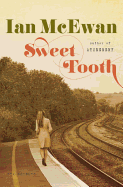
| Publisher: | Nan A. Talese | |
| Genre: | Espionage, Fiction, Romance, Historical - General, Thrillers, Literary | |
| ISBN: | 9780385536820 | |
| Pub Date: | November 2012 | |
| Price: | $26.95 |
| Fiction |
by Ian McEwan
Ian McEwan has not written a novel with a female protagonist since Atonement. In Sweet Tooth, he shows once again that he can inhabit the female voice completely.
Serena Frome ("rhymes with plume") wanted to major in English literature, but her mother convinced her to major in math. She acquiesced, got a barely respectable third at Cambridge and continued to read everything. She has a job with the British intelligence service MI5 by virtue of an affair with a married professor, Tony Canning, who recommended her for the position and eventually dumped her--literally and unceremoniously--at a layby. She doesn't learn the reason for that until years later; indeed, there are several things about Tony that Serena doesn't know.
Her duties at MI5 are mundane--file this, type that--until she is called in to see the higher-ups one day. Because she is a "literary type," she is recruited for "Sweet Tooth," a special project that aims to co-opt writers with somewhat leftish tendencies and steer them away from anti-Western bias. Serena will pose as the representative of a cultural foundation with money to give out and will "run" novelist and journalist Thomas Haley in the hope that he will write the sorts of articles MI5 is looking for.
Serena starts by reading Haley's short stories (curiously reminiscent of many of McEwan's), then meets and falls in love with the man. How can she continue to deceive him while really loving him? The resolution is vintage McEwan. --Valerie Ryan, Cannon Beach Book Company, Ore.
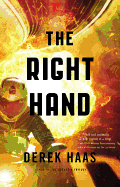
| Publisher: | Mulholland | |
| Genre: | Espionage, Fiction, Thrillers | |
| ISBN: | 9780316198462 | |
| Pub Date: | November 2012 | |
| Price: | $25.99 |
| Mystery & Thriller |
by Derek Haas
When the left hand doesn't know what the right hand is doing, it can deny all accountability. As the title of Derek Haass's The Right Hand suggests, CIA agent Austin Clay does things the U.S. government doesn't want to acknowledge. His latest mission is to recover a field operative captured by the Russians, but he bucks orders and attempts to rescue an innocent young Hungarian nanny as well. Unbeknownst to him, though, the Russians aren't the only ones set to battle Clay--to the death--in order to stop him.
Haas's screenwriting background (Wanted and 3:10 to Yuma) is evident in a panoply of visually-oriented action sequences that keep The Right Hand's pace swift and its intensity high. Occasional improbably convenient circumstances, like a fully functioning motorcycle at an uninhabited dacha, are easy to overlook when the plot quickly propels the reader on to the next scene with well-placed twists and engaging characters.
Austin Clay is a refreshing addition to the world of literary spies--a compassionate, complex character who makes mistakes and yet still succeeds in his field. Michael Adams, the newly appointed chief of EurOps, provides a strong counterpoint to Clay's action-driven character. Adams is a strategist; he excels with data and codes and planning. The dynamic between these two characters creates a rich diversity in Haas's world of espionage.
With any luck, The Right Hand is just the beginning of Austin Clay's exploits. Thriller fans will eagerly await his return. --Jen Forbus of Jen's Book Thoughts
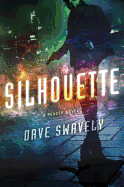
| Publisher: | Thomas Dunne | |
| Genre: | General, Fiction, Science Fiction, Thrillers | |
| ISBN: | 9781250001498 | |
| Pub Date: | November 2012 | |
| Price: | $24.99 |
| Science Fiction & Fantasy |
by Dave Swavely
In a not-so-distant future, the Great Quake has devastated the infrastructure of the Bay Area so severely that oligarchies of private security forces called "peacers" (i.e., peace officers) now rule much of the world, and San Francisco is in effect an independent city-state. For BASS officer Michael Ares, the line between good and evil, order and chaos, is about to be tested as he uncovers the motives behind the brutal murders of his four-year-old daughter and best friend in Dave Swavely's fiction debut, Silhouette.
Swavely, a Presbyterian pastor and author of four previous works of self-help rooted in Christian faith, spins a fast-moving, believable tale of flying aerocars, all-seeing falcon drones, mind-control microchips and ethical relativity as he navigates Ares through the investigation to discover the shadowy figure behind the crimes. In his quest, Ares begins to question his unconditional devotion to his long-time mentor Saul Rabin--as well as his brotherly rapport with Rabin's heir apparent, Saul's son Paul--and confronts his emotional failings as a father and husband.
Although the ending becomes increasingly predictable, Silhouette's saving grace lies not in the unfolding mystery but in the very real scenarios that Swavely paints. Echoes of Blade Runner and A Scanner Darkly run throughout a society ruled by corporate interests, sharpening the divide between the have and the have-nots. Ares's soul-searching journey echoes Swavely's own philosophical ministrations, where "risk and destiny are synonyms" and "the greatest men are the ones who make the most difficult choices." --Nancy Powell

| Publisher: | ||
| Genre: | Western, Fiction, Romance, Historical - General | |
| ISBN: | 9781451698244 | |
| Pub Date: | November 2012 | |
| Price: | $7.99 |
| Romance |
by Adrianne Wood
In Badlands Bride, Adrianne Wood (Mind Tricks) takes readers off the beaten path and on an entertaining romantic adventure.
Mason Donnelly is the best journalist on the frontier, but he hasn't landed a scoop in months and hopes his investigation of a Badlands fossil dig will help. His reporter's instinct tells Mason there's more to the dig than dinosaurs, but no one is talking, not even gorgeous and demanding heiress Lily Highfill.
Lily's spent several years exiled to Denver by her mother, who finds Lily's spirit embarrassing. With a return to Boston looming, Lily joins her grandfather and almost-fiancé on a fossil dig as a sketch artist. Rakish Mason initially piques her temper, but soon he's indulging her in a put-on flirtation to rouse her aloof beau's jealousy. As their flirtation turns serious, the paleontologists strike sapphires, and Lily knows she must convince Mason to leave before he learns of the find. A newspaper article about a cache of gemstones would ruin the dino dig altogether. But how can she turn him away when he's captured her heart?
The out-of-the-ordinary setting adds an extra dimension to Wood's traditional strife-turns-to-passion plot. Although the lovers' initial meeting is explosively snarky, Wood builds their relationship in a wholly believable fashion, and her decision to pair Lily with the penniless but gallant journalist rather than attempting to find redemption for the rich but unworthy suitor is endearing. Western romance fans should give this change of pace a try. --Jaclyn Fulwood, youth services manager at Latah County Library District and blogger at Infinite Reads
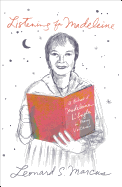
| Publisher: | Farrar, Straus & Giroux | |
| Genre: | Literary Collections, Women Authors, Biography & Autobiography, Women, Literary | |
| ISBN: | 9780374298975 | |
| Pub Date: | November 2012 | |
| Price: | $28 |
| Biography & Memoir |
by Leonard S. Marcus
In Listening for Madeleine, Leonard Marcus shapes the reflections of a wide range of Madeleine L'Engle's relatives, friends and colleagues into an unconventional biography--more of an oral history--of the award-winning novelist through the perspectives of those who knew and were influenced by her.
Marcus organizes the 50 interviews presented in the book according to the context in which the party knew L'Engle: writer, mentor, friend, family member or fan. While certain of her characteristics seem to have been evident to nearly everyone--her work ethic, her keen intellect and curiosity, her faith and spirituality--other facets of her personality were revealed, or experienced, less uniformly. For example, while many considered her giving, generous and warm, others perceived these qualities as part of a persona she cultivated rather than as natural attributes. Some of those closest to her have challenged that presentation, noting that L'Engle was a storyteller and writer of fiction, which extended to aspects of her own story.
If that's the case, then L'Engle's four memoirs, collectively known as the Crosswicks Journals, may not be genuinely autobiographical--or, at any rate, they may not be completely, factually accurate. That said, Listening for Madeleine isn't genuine, traditional biography, either. Rather, Marcus has assembled a fascinating, impressionistic portrait of a complex woman, a portrait that might best be considered as a companion to the Crosswicks Journals, giving readers the opportunity to see Madeleine L'Engle from a variety of angles. --Florinda Pendley Vasquez, blogger at The 3 R's Blog: Reading, 'Riting, and Randomness
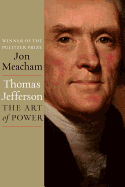
| Publisher: | Random House | |
| Genre: | Political Science, United States, General, History, 19th Century, Biography & Autobiography, History & Theory, Historical, Presidents & Heads of State | |
| ISBN: | 9781400067664 | |
| Pub Date: | November 2012 | |
| Price: | $35 |
| Biography & Memoir |
by Jon Meacham
Thomas Jefferson was full of contradictions: philosopher and politician, thinker and farmer, writer of the Declaration of Independence and slave owner. Jon Meacham, the Pulitzer Prize-winning author of American Lion, clearly understands what a complicated man Jefferson was. In Thomas Jefferson: The Art of Power, Meacham tries neither to lionize nor to denigrate his subject but to present him as a man who sought ultimate good yet was willing to compromise in order to succeed. Fearing a monarchical revival, Jefferson spent decades fighting against a strong central government, which led to the creation of a two-party American political system that endures to this day.
As Meacham points out, although Jefferson hated confrontation, he almost always managed to get his way through his skillful application of intellect and intrigue. From his privileged childhood through his college days in Williamsburg; his governorship of Virginia; his terms as ambassador, secretary of state, vice president and president, Jefferson was always planning and scheming and one step ahead of most of the people around him.
Meacham's deft portrayal of Jefferson's character and personal life lends a humanity to Jefferson that is clear, even 200 years later. Meacham creates a vision of a man who was unmistakably a genius, gifted in the art of power, whose impact upon American history cannot be understated. --Jessica Howard, blogger at Quirky Bookworm

| Publisher: | Riverhead | |
| Genre: | Body, Mind & Spirit, General, Religion, Spirituality, Devotional | |
| ISBN: | 9781594631290 | |
| Pub Date: | November 2012 | |
| Price: | $17.95 |
| Starred | Religion |
by Anne Lamott
In Traveling Mercies, her first memoir about faith, Anne Lamott asserted, "Here are the two best prayers I know: 'Help me, help me, help me,' and 'Thank you, thank you, thank you.' " In Help, Thanks, Wow, she has distilled those prayers to one word each--and added a third. In three brief chapters and a coda on "amen," she explores the wisdom and power of these four simple words.
Lamott's trademark wry humor shines through as she explains (with frequent reassurance for the religion-shy) why these prayers can help anyone. She admits to frustration that the world seldom works the way she wants it to. But instead of taking God to task (which she'd rather do), she prays "Help," acknowledges the limits of her own power, and finds (often surprisingly) that she can say "Thanks."
Gratitude is a popular and sometimes nebulous concept, but Lamott pulls no punches in her "Thanks" chapter: life is difficult, and gratitude does not necessarily erase the challenges. What it can do, she explains, is open people up to blessings they might not otherwise notice and make them more open to serving others. And while "Wow" can either express utter joy or raw grief, it serves a vital purpose in both forms--"making sure we are not dulled to wonder."
Longtime fans and new readers will appreciate Lamott's honesty and plain language (she avoids God-jargon whenever possible). Reactions may vary, but "thanks" and "wow" will certainly be among them. --Katie Noah Gibson, blogger at Cakes, Tea and Dreams

| Publisher: | Ecco / Farrar, Straus & Giroux | |
| Genre: | General, American, Poetry | |
| ISBN: | 9780374126087 | |
| Pub Date: | November 2012 | |
| Price: | $40 |
| Poetry |
by Louise Glück
It's difficult to summarize the career of Louise Glück in a brief review. She's the author of 11 books of poetry, as well as a collection of essays about poetry. Her work has been honored with the Pulitzer Prize, the National Book Critics Circle Award, the William Carlos Williams Award and the PEN/Martha Albrand Award for Nonfiction, along with fellowships from the Guggenheim Foundation, the Rockefeller Foundation and the National Endowment for the Arts. She's even been a chancellor of the Academy of American Poets and the poet laureate of the United States. There are more achievements that could be added to this list, but it is best to let her body of work speak for itself.
Poems 1962-2012 encompasses all of the verse in Glück's previously published books of poetry; with the collection arranged chronologically, the evolution of her career and the development of her work are clearly on display. Glück's style has always been somewhat spare but with evidence of tight control, and these abilities don't waver with time. Later poems, though, demonstrate a shift toward longer narratives and the sort of self-reflection that comes with increasing age, accumulated experience and an awareness of mortality. This retrospective collection is not to be missed. --Roni K. Devlin, owner, Literary Life Bookstore
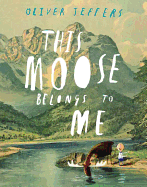
| Publisher: | Philomel | |
| Genre: | Animals, Pets, Juvenile Fiction, Humorous Stories | |
| ISBN: | 9780399161032 | |
| Pub Date: | November 2012 | |
| Price: | $16.99 |
| Starred | Children's & Young Adult |
by Oliver Jeffers
Oliver Jeffers's (Lost and Found) humorous and touching tale stars a child, Wilfred, who claims ownership of a moose that's its own master. Yet the boy finds a way to make the friendship work.
Blond-haired Wilfred, sporting bow tie and suspenders, makes a kind of "ta-da" gesture toward a four-legged spindly-legged moose with large antlers: "Wilfred owned a moose." Standing on a chair, the boy attaches a tag labeled "Marcel" on the furry fellow's right antler. Wilfred explains "the rules of how to be a good pet," but Marcel rarely follows them. Since the moose likes to go his own way and the boy has a poor sense of direction, he takes a ball of blue string to find his way back, which trails off the sides of the pages.
Jeffers creates thought balloons to depict the boy's fantasy of a tuxedo-clad moose serving drinks from a tray, and the two riding together over Niagara Falls in a barrel. The author-artist superimposes images of his boy and moose heroes atop stunning landscapes of the Grand Tetons, Mt. Hood and Wyoming's Jackson Lake. On one particularly long walk, Wilfred makes "a terrible discovery.... Someone else thought she owned the moose." When a dejected Wilfred rushes home to sulk and gets tangled in his blue string, who comes along to save him? Marcel.
Children will delight in detecting more than Wilfred does about the ways of animals in the wild, and will enjoy the book's gentle lesson that true friendship involves give and take. --Jennifer M. Brown, children's editor, Shelf Awareness
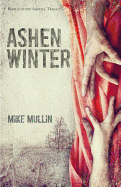
| Publisher: | Tanglewood | |
| Genre: | Science Fiction, Juvenile Fiction, Action & Adventure, Survival Stories | |
| ISBN: | 9781933718750 | |
| Pub Date: | October 2012 | |
| Price: | $17.95 |
| Children's & Young Adult |
by Mike Mullin
Ashen Winter picks up several months after the conclusion of Ashfall, the first book in this dystopian trilogy.
Alex and Darla have been living with Alex's relatives, working hard to help each other survive in a harsh new world. When Alex discovers a clue that could lead him to his parents, he and Darla take off to search for them and try to bring them back to the farm in Iowa.
The landscape isn't all that's bleak in the aftermath of Yellowstone's supervolcano. The government has failed to help, and roving bands of cannibals seek out fresh meat to sell on the black market. Surviving communities go on lockdown, making the difficult journey even more challenging. As Alex and Darla face one obstacle after another, the detailed explanation of each encounter sometimes slows down the action. But the realism of the storyline makes it impossible to set the book aside.
Mullin doesn't shy away from the brutality of the situations he's created. Yet in the midst of some tense moments, a new character, Ben, manages to lighten the mood with his focused perspective on all things mechanical. Circumstances have forced these teens to become adults. Their belief that things will get better gives them a reason to survive; their compelling stories will keep people turning the pages. --Sherrie Petersen, children's book reviewer and blogger